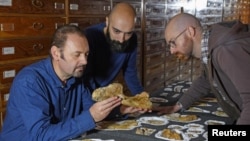Now, the VOA Learning English program Words and Their Stories.
On this show, we take a closer look at words and expressions in the English language. We explain where they come from and how and when to use them.
There are many times in life when we have disagreements or problems with other people. Maybe someone does something or says something that upsets us. But, it is best not to let these issues fester.
When a cut or wound festers, it becomes infected and painful. And, “fester” is also used to describe a problem that gets worse.
If you do not care for that medical image, you can also use the verb stew. When we stew over something, we think about it so much that it becomes a big problem for us. When we stew over something, we are upset or worried about. We do not talk about the problem bothering us. We stew over it until it becomes much bigger in our own minds.
If you stew over an unresolved problem, or let it fester, it can become a big issue. You might call it a bone of contention.
This phrase comes from the 16th-century. Imagine, if you will, two dogs fighting over a bone. The “bone” is the contentious issue that two people fight over. “Contentious” describes something that is likely to cause people to argue or disagree. For example, the world of politics has far too many contentious issues to name. If I tried, we would be here all day!
Okay so, unresolved issues often only get worse. Talking about them can help. But how do you raise the issue? Well, you could say to the person, “I have something upsetting to discuss with you and it is something that you did and I need to resolve it.”
But that is quite long. Thankfully, we do have an expression that means the same thing but has fewer words and is more interesting.
Instead, you can simply say, “I have a bone to pick with you.”
As with “bone of contention,” this phrase also comes from dogs during the 16th century. This time the dogs are struggling to pick the meat off of a bone.
If you use this expression, the other person will understand that a) you have a problem on your mind that you want to talk about and b) they did something to cause that problem.
We use this expression with our friends and family. It is a little informal but we can also use it at work.
Now, let’s hear two friends use these expressions:
So, is Steve coming to the party tonight?
Probably.
Good.
Why? And why do you have that look on your face?
What look?
Your angry look.
If you must know -- I have a bone to pick with him.
Not again. What is it now?
Well, I’d rather talk to Steve about it first.
Look, you can take care of your bone of contention with Steve some other time. I don’t want you two yelling at each other at my party.
What makes you think we’re going to yell?
Because the last the last time you had a bone to pick with him, it ended in a yelling match.
Oh, right. Well, this time it won’t come to that. I promise. We’ll talk in the kitchen. It’ll be more private.
No, not the kitchen! Take up your issue with him in the … garage. It’s more private and there are less things for you to break.
Agreed.
And that is the end of this Words and Their Stories! Until next time … I’m Anna Matteo.
Do you have something on your mind? Do you have a bone to pick with someone? Let us know in the Comments Section!
Anna Matteo wrote this story for VOA Learning English. Ashley Thompson was the editor.
________________________________________________________________
Words in This Story
fester – v. : to become painful and infected : to become worse as time passes
stew – v. : to be upset or worried
contention – n. something (such as a belief, opinion, or idea) that is argued or stated : anger and disagreement
informal – adj. having a friendly and relaxed quality








